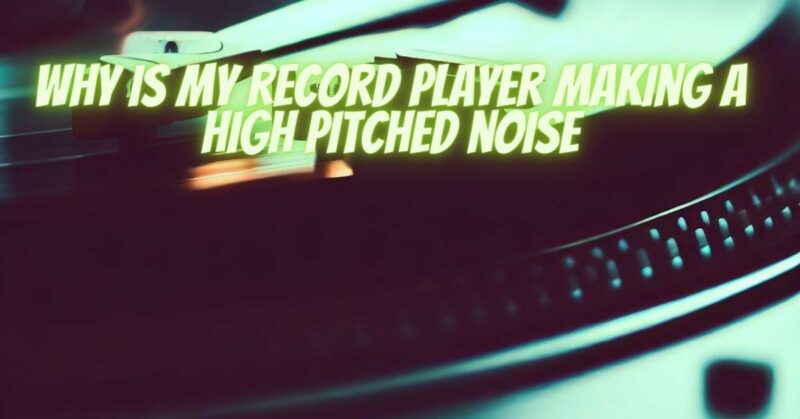The enjoyment of your vinyl collection can be disrupted when your record player starts emitting a high-pitched noise. This unwelcome sound can be attributed to various factors, including mechanical issues, electrical interference, or improper setup. In this article, we will delve into the common reasons behind high-pitched noises from record players and provide practical solutions to help you diagnose and resolve the issue, ensuring a smooth and enjoyable listening experience.
- Check the Stylus and Cartridge: A worn-out or misaligned stylus or cartridge can produce high-pitched noises. Examine the stylus under a magnifying glass for signs of damage or wear. If it appears damaged or dull, it may be time to replace it. Similarly, check if the cartridge is securely mounted and aligned correctly. Improper alignment can cause the stylus to track the grooves inaccurately, resulting in high-frequency distortion.
- Clean the Stylus and Records: Dust, debris, or residue on the stylus or records can interfere with the smooth playback and generate high-pitched noises. Clean the stylus using a stylus brush or a cleaning solution specifically designed for stylus maintenance. Additionally, clean your records using a record cleaning brush or a record cleaning machine to remove any contaminants that may affect playback quality.
- Adjust the Tracking Force: Insufficient or excessive tracking force can lead to high-pitched noises. Consult your turntable’s manual or cartridge specifications to determine the recommended tracking force. Use a tracking force gauge or scale to ensure precise adjustment. Too little tracking force can cause the stylus to skate across the record, while too much force can overload the grooves, resulting in distortion and high-pitched sounds.
- Check the Turntable Belt: If your record player is belt-driven, a loose or worn-out belt can cause high-pitched noises. Carefully inspect the belt for signs of wear, such as cracks or stretching. Replace the belt if necessary, following the manufacturer’s instructions. A properly tensioned and functioning belt ensures consistent rotation and reduces motor noise that may manifest as high-pitched tones.
- Eliminate Electrical Interference: Electrical interference from nearby electronic devices can introduce high-pitched noises into the audio signal. Ensure that your record player is positioned away from sources of electromagnetic interference, such as televisions, smartphones, or Wi-Fi routers. Additionally, consider using shielded cables to minimize the risk of interference and using a power conditioner or surge protector to stabilize the electrical supply.
- Inspect Grounding and Connections: Improper grounding or faulty connections can contribute to high-pitched noises. Check the grounding wire and ensure it is securely connected to the appropriate terminal or grounding point on your turntable. Additionally, inspect the connections between the turntable, amplifier, and speakers. Loose or damaged connections can introduce unwanted noise into the audio signal.
- Seek Professional Assistance: If the high-pitched noise persists despite your best efforts, it may be necessary to seek professional assistance. Consult a qualified technician or an experienced audio specialist who can diagnose and address more complex issues with your record player’s internal components or circuitry.
Conclusion:
A high-pitched noise emanating from your record player can be a frustrating experience, but it is not an insurmountable problem. By carefully examining and addressing potential causes such as stylus and cartridge condition, cleanliness, tracking force, turntable belt, electrical interference, and connections, you can significantly reduce or eliminate the high-pitched noise and restore the integrity of your audio playback. Remember to approach each troubleshooting step with caution and precision. With proper care and attention, you can enjoy your vinyl records with the pristine sound they deserve.

